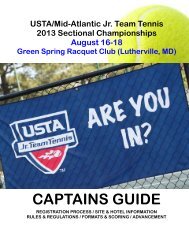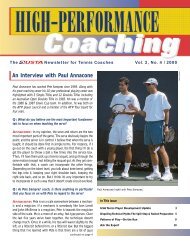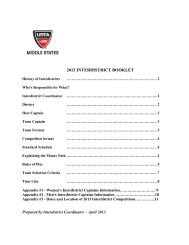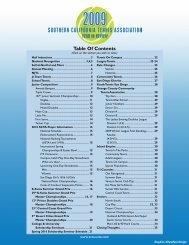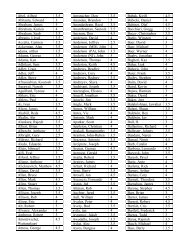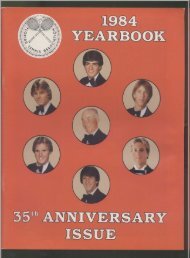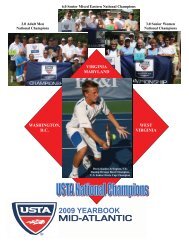FRIEND AT COURT 2010 - USTA.com
FRIEND AT COURT 2010 - USTA.com
FRIEND AT COURT 2010 - USTA.com
Create successful ePaper yourself
Turn your PDF publications into a flip-book with our unique Google optimized e-Paper software.
A. Definitions<br />
Actions Initiated by Player or an Adult on behalf of a Junior<br />
Actions Initiated by an Official<br />
Withdrawal<br />
Walkover<br />
Retirement<br />
Injury, Illness,<br />
or Personal<br />
Emergency<br />
Adult Discipline<br />
Default<br />
Default for Refusal<br />
to Play<br />
Abandoned<br />
Match<br />
Unplayed<br />
Match<br />
Disqualification<br />
TABLE 8<br />
Draw Sheet Terminology and Procedures<br />
A withdrawal occurs when a player decides not to play all matches in an<br />
event. A withdrawal occurs only before (or during the warm-up for) a<br />
player’s first match in an event. If the withdrawal occurs before entries<br />
close, the withdrawal may be for any reason. If the withdrawal occurs after<br />
entries close (regardless of whether the draw has been made), it must be<br />
for injury, illness, or personal emergency. A withdrawal also may occur as<br />
a result of a tournament administrative error. Refusal to play for any other<br />
reason is treated as a default.<br />
A walkover occurs when there has been an administrative error or when a<br />
player decides not to play a match in an event because of injury, illness, or<br />
personal emergency. Refusal to play for any other reason is treated as a<br />
default. When a player decides not to play the player's first match but is<br />
allowed to play in the consolation, the first match is treated as a walkover.<br />
A retirement occurs when a player is unable to continue playing a match or<br />
resume a suspended match because of injury, illness, personal emergency,<br />
or adult discipline. Refusal to play for any other reason is treated as a default.<br />
These terms should be understood in their everyday sense. The terms also<br />
include situations when an adult decides that a Junior will not play because<br />
of injury, illness, or personal emergency.<br />
Bona-fide reasons for not playing other than illness or injury shall be treated<br />
as personal emergencies. Wanting to get home earlier or to play in another<br />
sporting event is not considered a personal emergency.<br />
A Referee should give a player the benefit of the doubt when deciding whether<br />
the player’s reason for not playing is bona-fide. For example, a young female<br />
player may be too embarrassed to reveal her real reason for not wanting to<br />
play or not being able to continue playing. Other examples of bona-fide<br />
reasons for not playing could include being emotionally distressed over the<br />
break up of a relationship or over the death of a relative or friend.<br />
Adult discipline occurs when a parent, coach, or other person responsible for<br />
a Junior disciplines the Junior by not allowing the Junior to start or finish a<br />
match. Adult disciplines are treated as defaults if the match has not started and<br />
as retirements if the match has started. There is no such thing as a withdrawal<br />
or walkover because of an adult discipline.<br />
A default occurs when the Referee does not allow a player to begin or continue<br />
a match. Examples of this kind of default include a player who does not show<br />
up, a player who is defaulted for lateness, and a player who is defaulted for<br />
receiving an injection, infusion, or supplemental oxygen.<br />
A default also occurs when a player refuses to play or continue to play for<br />
reasons other than injury, illness, or personal emergency. Examples of this<br />
type of default include refusing to play in order to get home sooner or in<br />
order to participate in another sporting event.<br />
An abandoned match refers to a match that has started, but the Referee has<br />
decided that the match will not be <strong>com</strong>pleted. There is no winner or loser of the<br />
match.<br />
An unplayed match refers to a match that the Referee decides will not be started<br />
for any reason other than a withdrawal, walkover, default, or retirement.<br />
There is no winner or loser of the match.<br />
A disqualification occurs when the Referee removes a player from an event<br />
because the player was not eligible for the event.<br />
104 <strong>USTA</strong> REGUL<strong>AT</strong>IONS III.B. (Referee Responsibilities After Draw Has…)



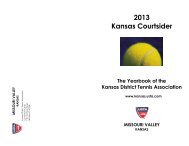

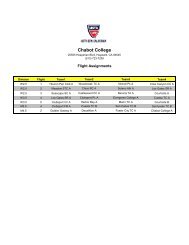

![COMPLETE - 2013 Tournament Schedule [11_20_12] - USTA.com](https://img.yumpu.com/21906454/1/190x245/complete-2013-tournament-schedule-11-20-12-ustacom.jpg?quality=85)

